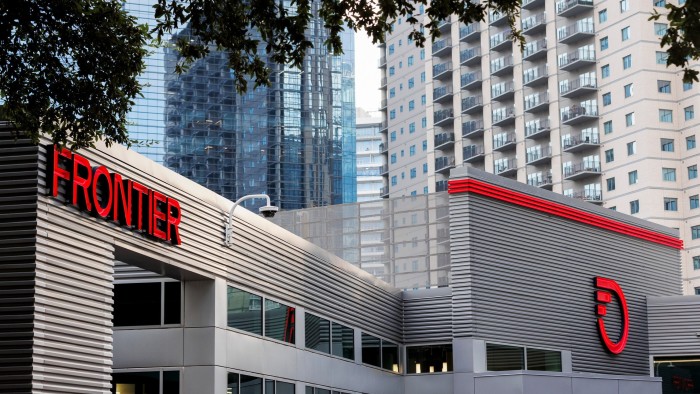
Unlock the Editor’s Digest for free
Roula Khalaf, Editor of the FT, selects her favourite stories in this weekly newsletter.
Verizon’s $20bn acquisition of Frontier Communications faces a nail-biting showdown at an investor meeting next week after some of the biggest shareholders in the fibre network company demanded at least a 30 per cent price increase.
Canada-based BCE’s proposed $3.6bn acquisition of Ziply this week — a telco with a fibre network similar to that of Frontier — has become a flashpoint.
The Frontier investors have told Verizon and the Frontier board that the valuation metrics in the Ziply deal imply a far higher purchase price for Frontier, citing the long-term growth prospects for fibre broadband service.
According to an analysis prepared by Frontier’s shareholders, the company’s projected growth makes its shares worth more than $50 a share, far higher than the deal price of $38.50.
Glendon Capital Management and Cerberus Capital Management, which combined own about 17 per cent of Frontier shares, are among the investors angling for a higher deal price, said multiple people familiar with the matter.
Ares Management, the company’s single largest shareholder with about a 15 per cent stake, has not indicated which way it plans to vote, said people familiar with the matter. It has hired boutique bank Houlihan Lokey to evaluate its options.
Verizon’s offer in early September represented a 44 per cent premium over Frontier’s trading range at the time. The company has said its offer is fair and it does not plan to raise the price. But the acquisition is also central to the company’s strategy of expanding its fibre internet capabilities, which shareholders view as a sign it will not let the buyout collapse.
Frontier has said that if shareholders reject the deal terms, the company will return to its strategy as a standalone business. The company’s share price was about $34 on Friday. Some analysts are sceptical of the shareholders’ lofty Frontier valuation.
“Frontier’s shareholders’ choice is really between $38.50 per share in cash or a go-it-alone future with the risks and opportunities that journey presents,” Nick Del Deo, a managing director at MoffettNathanson, wrote in a note on Wednesday.
Verizon and Frontier declined to comment.
The proposed deal suffered additional blows in recent days, after the closely watched proxy advisers Institutional Shareholder Services (ISS) and Glass Lewis directed investors to abstain from voting next week, which in effect counts as rejecting the $38.50 price.
“Given the possibility of substantially more value down the line, and the lack of urgency to approve a transaction that is not projected to close for more than a year, it seems reasonable for shareholders to exercise the optionality of abstaining for the time being,” ISS said in its report on November 1.
Frontier filed for bankruptcy protection in 2020 after the acquisition of a regional telecoms business resulted in an unsustainable debt load. It emerged from bankruptcy in 2021, in which it transferred equity control to its bondholders, allowing it to shed billions of dollars of liabilities. Shortly after, it relisted on the stock market.
Some of the company’s biggest shareholders — including Ares, Cerberus and Glendon — have been with the company since bankruptcy. The investors were some of the group’s biggest noteholders, with Cerberus owning more than $500mn of its debt, according to court filings.
The activist hedge fund Jana Partners successfully pushed Frontier into starting a sale process earlier this year, before the company’s management had initially planned.
Recent deals between Verizon’s rivals have upped the competition in the sector, with T-Mobile earlier this year announcing joint ventures with private equity groups EQT and KKR to buy Lumos and Metronet, respectively.
Telco companies that historically relied on legacy copper wire businesses, such as Frontier, have been investing heavily in fibre networks to compete with cable broadband providers. While their traditional businesses have suffered in recent years, there is renewed interest in fibre internet buildouts as data loads explode with coming artificial intelligence applications.
“This is a true game of chicken,” said one person involved in the transaction.
Additional reporting by James Fontanella-Khan and Eric Platt in New York